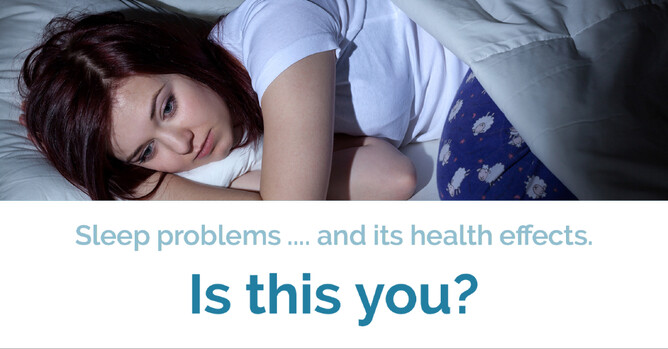Sleep is your Superpower (Matt Walker)
If you've arrived at this blog, then lack of sleep and it's effects on your health (maybe mental health particularly) must be of concern. Take some time to watch the 'Sleep is Your Superpower' TedTalk by Matt Walker (above) to understand how sleep deprivation can affect our health.
WHAT IS SLEEP?
Sleep is defined as a state of unconsciousness from which a person can be awakened from. Sleep involves the circadian rhythm which is a 24-hour internal clock (sleep/wake cycle) within your brain that cycles a person between alertness and being asleep at regular times.
| There are 5 Stages in the Sleep Cycle |
|---|
Stage 1
- Interim between consciousness and sleep
Stage 2 (after 5-15 mins)
- Heart rate slows, brain does less complicated tasks
Stage 3 (after another 15 mins – move into non-REM sleep 'Delta Stage')
- Body makes repairs
Stage 4
- Body temperature and blood pressure decreases
Stage 5 (move into REM sleep approx 90 mins after first feeling sleepy)
- Increase in eye movement, heart rate, breathing, blood pressure and temperature
Light-dark exposure changes can shift the timing of the circadian system, which impairs the ability to sleep and wake at the appropriate times. Night shift workers can suffer from these effects.
| Sleep is important for: |
|---|
| • Learning and cognitive skills |
| • Strong immunity |
| • Mental relaxation |
| • Rejuvenation and repair of the body |
| • Memory processing |
| • Hormone regulation |
| • A natural anti-epileptic influence |
| • Supports healthy glucose regulation |
| • Repairing of skin |
| • Restoration of body energy |
| • Accelerated body growth |
| • Muscle growth and development |
| • Blood cell and tissue rebuilding |
Within the brain is the hippocampus which is the information inbox for receiving and retaining new learned information and memories. Research completed by Matt Walker and team showed that those who have a good nights sleep are shown to have lots of healthy learning-related activity in this hippocampus region of the brain, where those who are sleep-deprived do not show any active signals, and their memory inbox is not functioning appropriately e.g. new incoming information is being bounced.
Deep sleep is particularly important as it allows 'file transfer' mechanisms to occur. Memories are shifted from a short-term 'vulnerable reservoir', to a more stable long-term storage area within the brain where they become safe and protected.
| What can alter our sleep? |
|---|
- Infections – viral, bacterial, candida, parasites
- Cellular detoxification – is shown to be combined to the body's rest-activity cycle e.g. sleep times
- Obstructive Sleep Apnoea Syndrome (OSAS) – symptoms include heavy snoring, stop breathing while sleeping, excessive daytime sleepiness, high blood pressure, morning headaches, restless sleeps, depression, severe anxiety, gasping episodes, bed wetting
- Traumatic brain injury – motor vehicle/bicycle/motorbike accident, falls, violence, recreational injury, shaken infant syndrome
- Electro-magnetic radiation fields (EMF) – mobiles, radio and television transmitters, microwave oven use, radar installations
- Sleep disorders – new born baby, jet lag, shift work, seasonal depression, metabolic syndrome, weight gain, drug addiction (see below), minor head trauma, whiplash
- Foods & eating times – diets (Atkins, Ketogenic, low fat/high carb, high protein, low salt / magnesium diet), fasting, alcohol, caffeine, high sugar intake, eating late, eating during the night, anorectics and bulimics
ILLICIT DRUGS & REM SLEEP
Sleep can be majorly influenced by recreational drugs, particularly cocaine, ecstasy, and marijuana.
Cocaine use increases wakefulness and suppresses REM sleep, and a sudden withdrawal is associated with sleep disturbances and unpleasant dreams.
MDMA (ecstasy) use is associated with ongoing sleep disturbances due to neurotransmitter damage e.g. serotonin, which can lead to depression.
Smoking marijuana and use of oral THC reduces REM sleep. It can initially aid in the onset of sleep, however long-term sleeping difficulties, and strange dreams can occur on withdrawal of use e.g. decreased quality and quantity of sleep.
| Herbs and Sleep |
|---|
There are a wonderful range of plants that aid in inducing sleep, and helping to restore a disrupted circadian sleep cycle over time.
If you would like to learn more about improving sleep associated with any mental health issues, infections, or dietary habits, then please get in touch / book an appointment with Raissa Ringer.
| REFERENCES | ||
|---|---|---|
YouTube – Sleep is your Superpower (Matt Walker) Sleep, Health & Consciousness: A Physician's Guide. (R. Samvat & H. Osiecki). 2009 | ||

